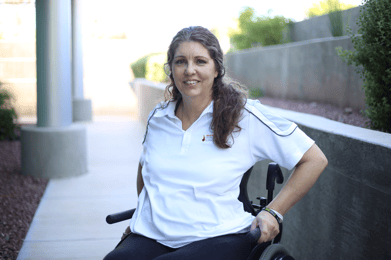Hope Happens Here: Jennifer Longdon
When Jennifer Longdon was told it wasn’t possible to have curb cuts installed near her Phoenix home, she got angry.
Just two years earlier, Longdon had sustained a spinal cord injury in a random drive-by shooting outside her favorite taco shop. An ordinary decision to eat dinner out intersected with an unthinkable act of violence. Five bullets were fired into the car; one struck her spine, paralyzing her from the chest down. In an instant, her life changed forever.
Longdon lost part of both lungs and spent months in the hospital, rescued in her darkest moments by the fierce love she felt for her 12-year-old son. She fought through a grueling rehabilitation, regained her strength and began to build a new life, determined that it would not be a lesser one.
The lack of curb cuts was just one of the many barriers she wasn’t willing to accept.
“I didn’t intend to give up my equity,” she says. “I knew there was a law that wasn’t being applied fairly and I intended to change that.”
She called her local councilmember. Longdon’s block soon received a curb cut that not only allowed her to move easily through the neighborhood but also benefited elderly neighbors, young parents pushing strollers and kids riding bikes. Even better, her efforts had a wider impact: the city would now be required to install mid-block curb cuts if requested by homeowners.
“I created a new city policy, and it was important,” she says. “I got something done. I worked within the system and that felt really good.”
It was a pivotal moment, launching Longdon on a path of passionate advocacy that eventually led to the Arizona House of Representatives where she was recently re-elected to a second term.
“Every person who has sustained a spinal cord injury has their own moment of tragedy or trauma where it sinks in what has happened to them,” she says. “I think the most important thing is what comes next.”
Longdon’s injury opened her eyes to the daily challenges and discrimination endured by people with disabilities. She wrote to local representatives and attended rallies and hearings to advocate for disability rights and laws to end gun violence, once breaking her pinky knuckle while visiting the statehouse on a too-narrow bathroom stall door in its basement.
The internet served as a lifeline for expressing her frustrations and provided a link to other individuals with disabilities. Longdon found her voice on Facebook, spotlighting access and poverty issues facing the community alongside sometimes blistering critiques of organizations who fell short in the fight.
“I wanted to educate other people,” she says. “My message was, ‘I don’t want you to feel sorry for me. I want you to be angry beside me. And then we need to take that and fix things.’”
She used details from her own life to try to wake people up. During a TEDx talk, Longdon contrasted her challenges finding public bathrooms that could accommodate her wheelchair with painful memories of her former able-bodied self casually choosing accessible bathroom stalls when others were free.
“I’d never considered that in making choices for my own convenience I could be disenfranchising a person with a disability” she said.
The more Longdon spoke, the more people listened. She was invited to join the Phoenix Mayor’s Commission on Disability Issues, where she helped strengthen disability protections in a non-discrimination ordinance, increase access and inclusion for disabled individuals at special events, and change the official language the city used from “handicap” to “disabled.”
“It doesn’t seem like a lot, but how you name someone defines their worth and value,” she says.
In 2015, more than a decade after she first sent away for the Reeve Foundation’s Paralysis Resource Guide to help navigate her new injury, Longdon was tapped to chair its Public Impact Advisory Panel. President & CEO, Reeve Foundation, Maggie Goldberg describes Longdon as someone who “challenges us and makes us think.”
“Every action she takes is for the betterment of the entire community,” Goldberg says. “She is remarkable, and she would hate to hear me call her that, but that is truly what she is. It has been incredible to watch her rise through politics and as an advocate.”
In 2018, with increasing concerns about the direction of state legislation, Longdon ran as a Democratic candidate for the Arizona House of Representatives.
“I kept thinking, ‘Somebody ought to run, somebody ought to run,’ until somebody reminded me that I was somebody,” she says. “And here I sit.”
As a representative of the 5th district, Longdon has called for permanent funding for a statewide ADA coordinator and led a task force working to improve protections for vulnerable adults. Because of her presence in the building, there is now a ramp to the speaker’s dais and accessible bathrooms on every floor.
Within months of her 2019 swearing-in, Longdon tweeted a photo of a young girl in a wheelchair sitting behind Longdon’s accessible desk on the statehouse floor: “Ensuring ALL our children see themselves in the future matters.”
“Representation matters,” she says. “I don’t do this for me. I do it for my community. I’m fine. I have a beautiful, accessible home. I can stay here and grow tomatoes. My life is good. But I need to continue this fight. I think of people who didn’t make it this far and I think about kids like my own son. This is about creating the world I want to leave for them. And we’re doing it. A little bit at a time, but we are doing it. And I’m glad to have the weight of the Reeve Foundation here to help.”
Join Our Movement
What started as an idea has become a national movement. With your support, we can influence policy and inspire lasting change.
Become an Advocate